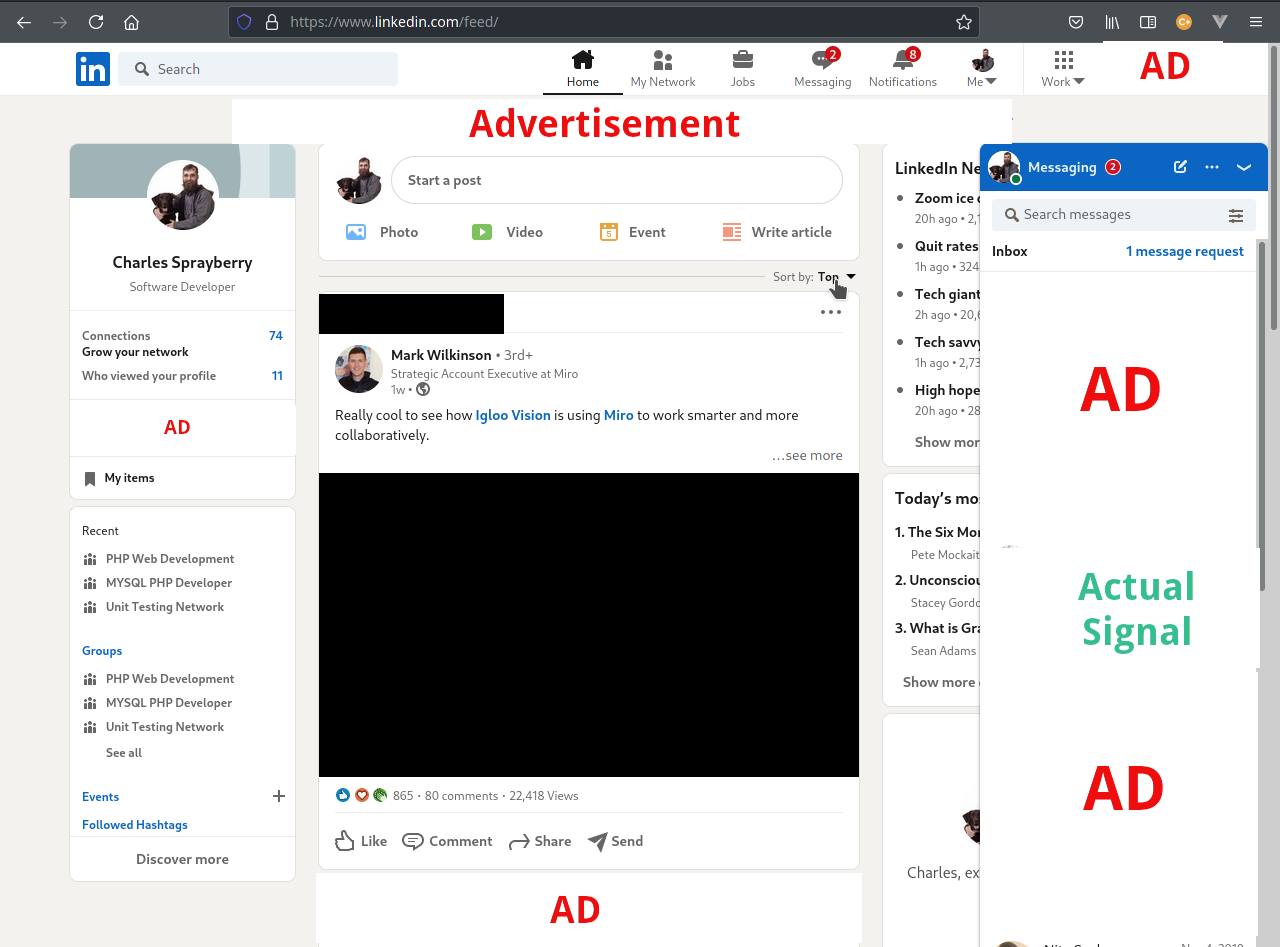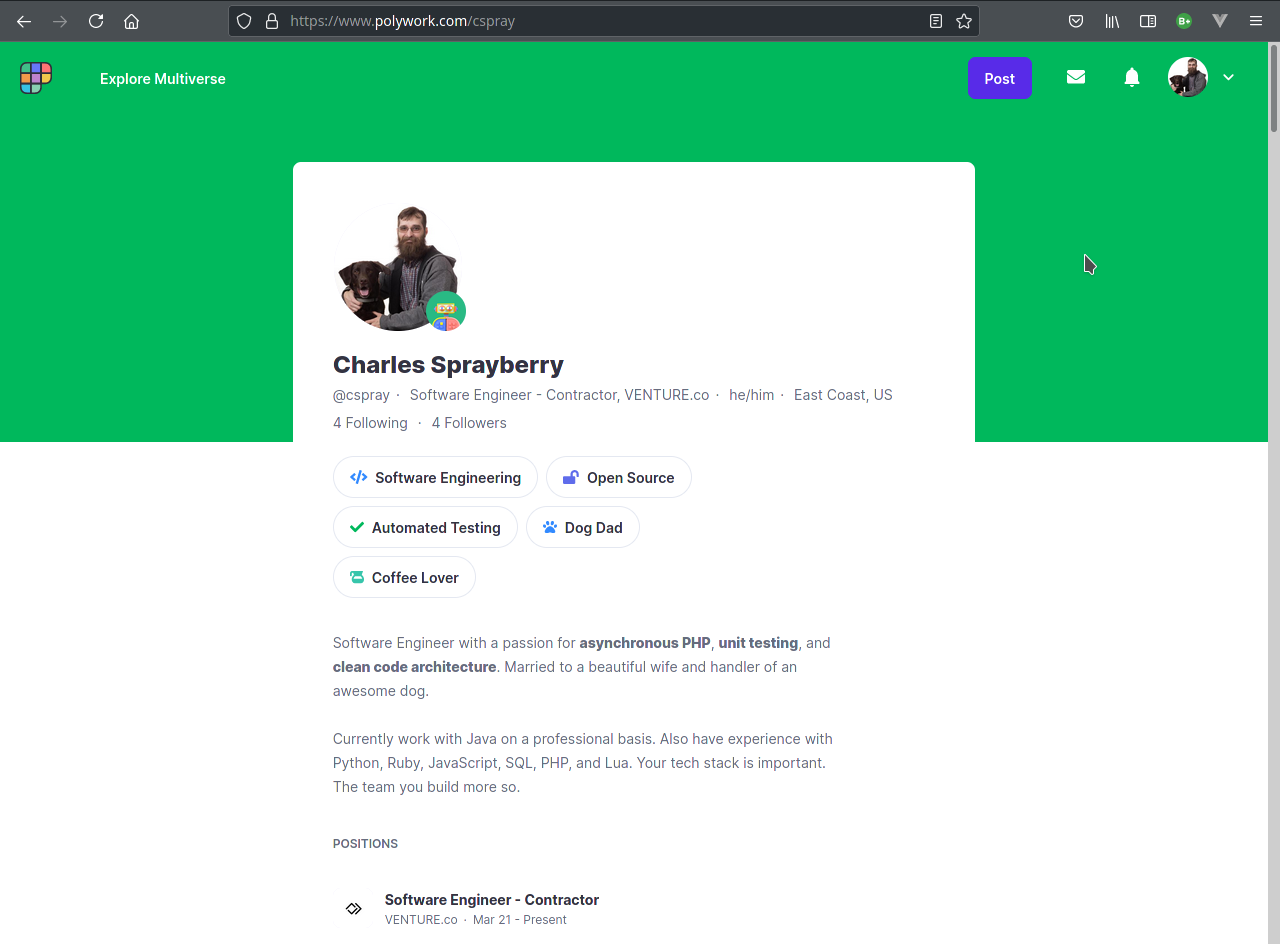Embracing Polywork
Recently I was lucky enough to get an invite code from a new professional networking app called Polywork. Having had a really sour experience with LinkedIn I was a bit hesitant at another professional network at first. After having had some time setting up the beginning of my profile and seeing what the site is about I'm really excited about the future of professional networking… and ridding myself of LinkedIn once and for all.
There's two specific aspects of these professional networking apps I want to focus on. The first is how each tackles the problems I have with Impostor Syndrome. The second takes a look at the user experience and sense of purpose for each app when I visit my logged-in user's homepage. While there are a lot of things I could talk about with Polywork I want to keep the post to a reasonable length and try to keep a fair comparison between the 2 platforms. I considered talking about Polywork first, but I'd rather the article end on a positive note and that's unlikely if the last thing we talk about is LinkedIn. So, we'll dive into them first.
A Brief History of Me
Before we can really talk about the differences between the 2 platforms I think it is important to provide a little context of my professional background. I've been a professional software developer for about 8 years. Before that I worked in the food service industry for nearly 15 years. I have no formal education beyond a high school diploma and within that program there was nothing about computers beyond learning how to type. I took a long, circuitous route to becoming a software developer. It is why I deal with Impostor Syndrome a lot. I'm constantly in fear of somebody realizing that I don't actually belong in this industry, and I'd be relegated to food service again. Building up a profile and portfolio of my work that can keep me gainfully employed is incredibly important to me as my wife and I work on building a home and life together.
We don't need to go much further than that but it is important to remember reading the rest of this article the context and mindset I'm approaching this from.
Why I really dislike LinkedIn
Have I mentioned I'm not a big fan of LinkedIn? I started to dislike the platform during the setup process, which probably didn't bode well, and my dislike increased every time I interacted with my profile. This was not a community problem but an issue I had with the platform itself.
Exacerbating my Impostor Syndrome
Relative to the amount of time I've been employed in my life, nearly 25 years, my LinkedIn profile is fairly new. Believe it or not, when you're applying to slap dough and deliver pizzas they're not checking out LinkedIn. Only when I started becoming established as a software developer did I really need to think, or care, about the network. To be perfectly honest, another developer had to explain to me what LinkedIn was at my first programming job. I knew I needed to get my face out there, so I went about setting up my profile… and it was all downhill from there.
This may have changed recently but when I was setting up LinkedIn they had a step-based flow that had you complete various sections of your profile. I eventually got to the section where they asked for my education. Not actually having any education to brag about I just selected the skip option. Unfortunately, LinkedIn was really insistent that I input a university that I attended. Nearly every time I would visit my profile there'd be a big flashy notification telling me to input my education. A big flashy notification reminding me that I'm not educated. A big flashy notification that made me feel like ass.
Your app should never make the user feel like ass
I eventually decided to put in something just to make the notification go away. It was obviously fake but I felt it was incredibly cringe worthy. I didn't like the platform effectively coercing me into presenting myself in a way I didn't like. Just so the platform would stop making me feel inadequate. It feels like a fairly small thing looking back on it now but when you're dealing with already feeling like an impostor the very last thing you want is software making you feel like an impostor.
Poor Signal to Noise Ratio
I don't want to do a thorough review of the entire LinkedIn UI… for the benefit of reader and writer. Instead, I'm just gonna look at what happens when I go to https://www.linkedin.com. I redacted some of the information to not inadvertently expose names. This is what it looks like for me.

It is really hard to ignore all the big white squares marked "Ad". I don't hold a grudge against a platform needing to monetize but especially egregious are the "Sponsored" direct messages. Having some tech recruiting company send me an advertisement in the guise of a personal message is especially trashy in my opinion. Sorry, I had to choke back a little bile…
The UI itself cuts off potentially useful information, the stuff behind the messages, presumably so it can show me more ads in the messenger. What's this stuff about the groups I belong to? I don't know. I don't remember joining them, maybe I did? In short, when I look at this UI I see Facebook with a professional veneer. I don't especially care for Facebook and I have little use for Facebook-in-a-suit.
Why I like Polywork
There's a lot of nuanced reasons why I like Polywork. From the badging system, to the timeline approach to posts, to their controls over how you should be contacted. As I mentioned I want to keep this fair and will only look at the same 2 facets of Polywork; how it deals with my Impostor Syndrome and the initial reactions when visiting my logged-in user's homepage.
Relieves my Imposter Syndrome
As I began setting up my profile and filling out my timeline I started thinking about all the work I've done. I only have a fraction of what I've done over the years actually posted. What I went through helped me realize that I do belong in this industry. Thinking about all the stuff I want to add to my timeline only helps solidify that feeling. I don't need my colleagues to give me LinkedIn endorsements. I want to show that we collaborated together to solve a business problem. The precise technology we used to solve the problem just doesn't seem as relevant at this point in my career. The collaboration with a colleague is what I want to highlight. Polywork seems setup right out-of-the-box to do exactly that.
Polywork helps me tell the story of why I'm not an impostor. It provides a platform for me to tell that story in a way that isn't hidden behind private GitHub repos or requires an understanding of computer programming. This isn't just not making me feel like an ass the way LinkedIn did but helping me not feel like an impostor at all. For me that's huge.
Great Signal to Noise Ratio
I'm gonna do the same review of the Polywork UI when I go to https://www.polywork.com as a logged-in user.

Not only are there no advertisements redacted there's nothing redacted. The purpose of this page is specific enough that there's no superfluous information. What is the purpose of this page? To showcase yourself! To build up a profile and timeline of your work and good deeds to let other collaborators and potential employers know what you've done and who you are. The purpose and signal here are great and there's nothing to distract from that purpose.
Looking Forward
I'm really excited about the future of Polywork. I hope they continue to execute on their plan and make improvements to the software. I really hope they can monetize without having to bombard me with ads the way LinkedIn does. I'm thankful for a method to help me with dealing like an impostor. I plan on staying involved with the Polywork community and continuing to build up my profile with past and present work. You can check out my Polywork profile at timeline.cspray.io.

